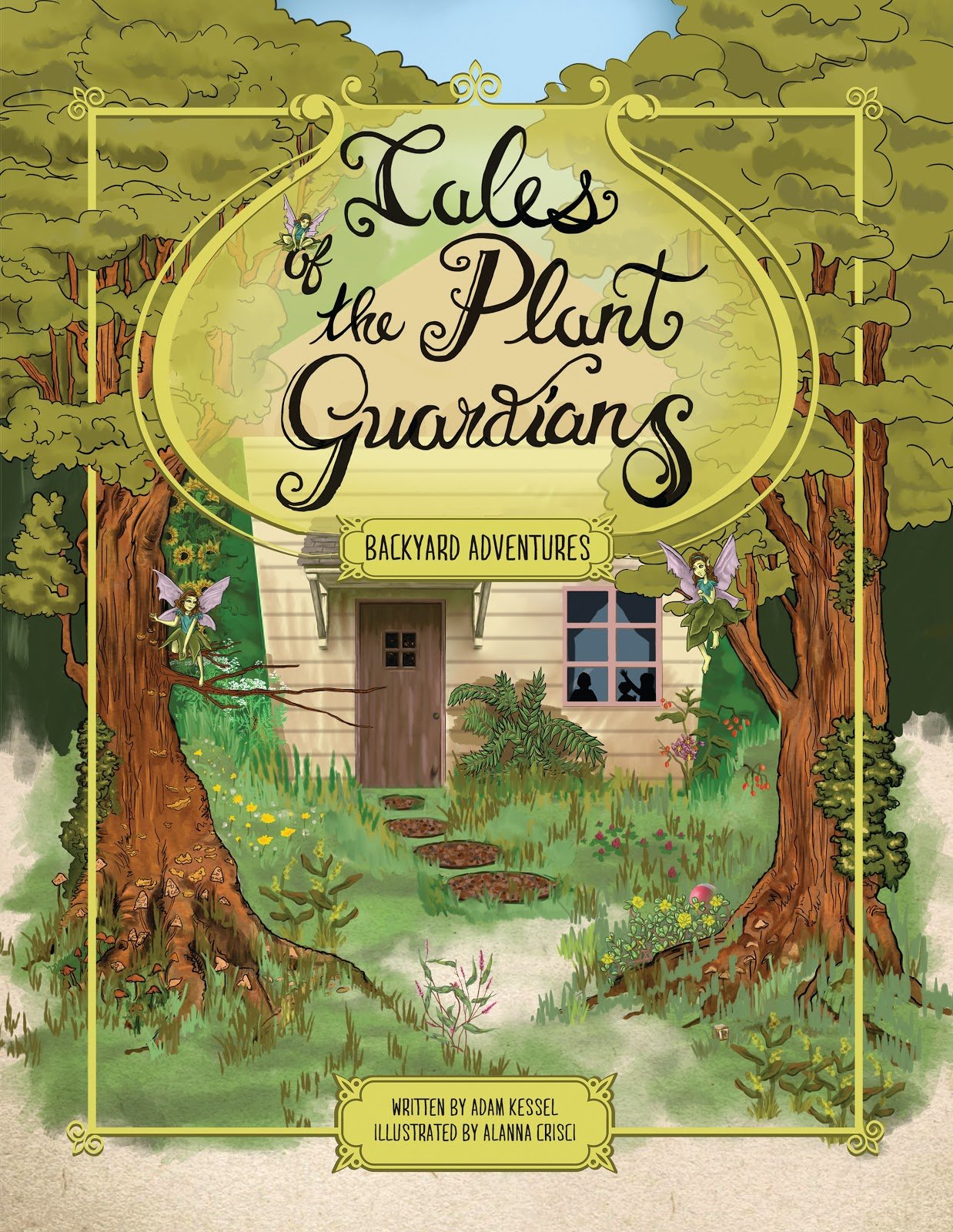Book Review: Tales of the Plant Guardians: Backyard Adventures
Tales of the Plant Guardians: Backyard Adventures, Adam Kessel, Sunflower Trail Publishing, April 2021, Hardcover, Paperback and E-Book, 3,000 words.
Review by Susan Gaspar.
“Once upon a time…”
Adam Kessel’s Tales of the Plant Guardians: Backyard Adventures begins with the familiar opening of classic fairy tales, but after two pages it’s clear that this book is more than that. Whimsical pen illustrations and lilting rhymes on these first two pages put you in the mood for a story, but read on, and you are introduced to a magical world full of fairies and the outdoor habitats they navigate—which happen to be places unknowing humans might tread at any time. Backyards, gardens, alleyways, city parks, country lanes—these are the places you will find the plants in Tales of the Plant Guardians.
Lushly colored illustrations by Alanna Crisci are a treat for the eyes and pull you in, tempting you to linger on each fanciful curlicue, feathery leaf, curved blossom, and delicate dewdrop.
I found myself getting lost in these pictures, and after reading the text, I would stare at the imagery and let the spirit of the story lift me away. Readers could look at this book solely as a lovely children’s tale that’s fun to read aloud because of its entrancing rhythms and rhymes. But that’s only half the story, and if you stay alert, there is much to learn from both the words and the pictures.
For centuries humans have been intrigued with the idea that fairies live and thrive among us in a hidden world, but when you pause to think about how close that world might be, the idea truly comes alive. This book’s leisurely pace and rich detail invite readers to slow down, pay attention, and take notice of the small things that often escape our view. Midway through the book, you feel as though you have been let in on a secret.
The text has a musical feel, with folksy references and suggested home remedy uses for each plant. The tone is gentle and patient, like the voice of a parent or grandparent speaking to a curious youngster.
There is also a teaching angle that is often camouflaged beneath the charming pictures and poetry. The book shares valuable information about common plants, most of them considered weeds, that we see almost everywhere. But there is also a deeper current running through these pages about the undeniable connection between plants, people, and everything we cannot see—a hidden world of both science and folklore. We feel a connection between the natural world and our daily lives, which are often hurried and stressful. At its core, Tales of the Plant Guardians teaches the reader to take heed and, like the fairies who guard the plants, be a guardian of the earth itself.
Author Adam Kessel is a teacher and naturalist, and his passion and enthusiasm is evident. To bring the botany lessons home, there are fast, fun quizzes to test your knowledge at the end of the book, as well as handy plant notes that give more information about the features and uses of each plant. I was fascinated enough to do further research online to confirm I’d seen the plants in my neighborhood.
Crisci’s illustrations beautifully serve Kessel’s words, and the plant close-ups, expressive fairy faces, and wild creatures (butterflies, ladybugs, bumblebees, and caterpillars) have their own personality. It makes it much easier to remember the plants when there is something visually definitive to represent each one. I was also entertained by the inclusion of everyday items strewn about within the images: a set of keys, a fork, a marble, which provide scale for the plants and fairies and also serve to further draw you into the hidden, ground-level environment.
Kessel’s book is perfect for a read-aloud session with children, or as a take-along reference guide during walks and other outdoor excursions. The practical information within is entertaining and empowering for both children and adults. As an avid container gardener, this book made me long for a big backyard, but as the plant descriptions point out, city dwellers can experience these plants and enjoy their own outdoor adventures in public parks, alleys, and even by taking note of cracks in the sidewalk. The plant kingdom is vast, mysterious, and resilient, and has much to teach us if we are willing to learn and explore.

